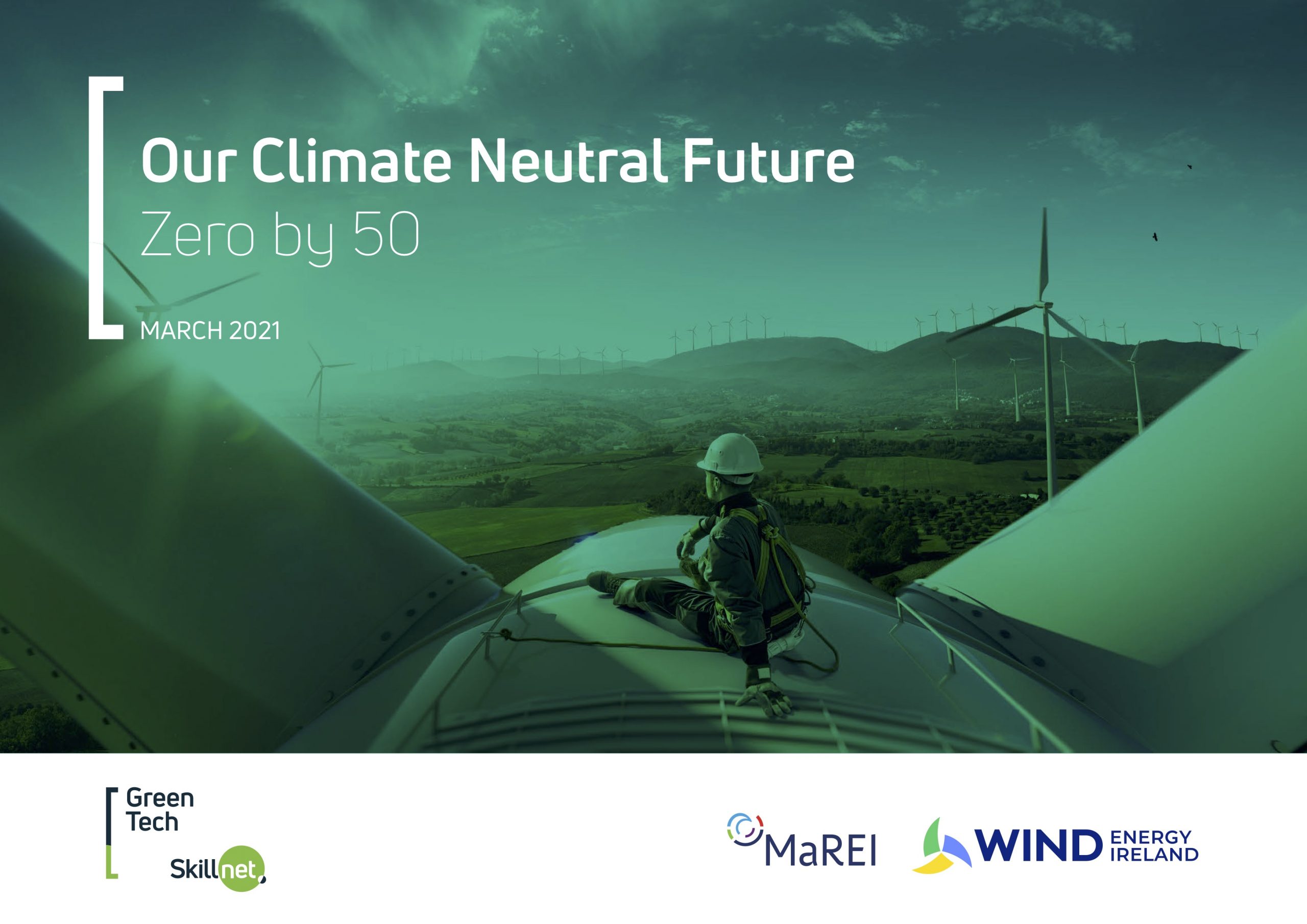
REPORT – Our Climate Neutral Future: Zeroby50
New report from MaREI and Wind Energy Ireland shows how Climate Bill can be delivered
Report welcomed by Minister Ryan
A Net-Zero Energy System for Ireland is possible by 2050, cost-effective and has the potential to create more than 50,000 jobs according to a new report published today by MaREI, the SFI Research Centre for Energy, Climate and Marine, hosted by University College Cork, on behalf of Wind Energy Ireland.
Click here to read the report.

Our Climate Neutral Future: Zeroby50 is a call to action for the Government and for every level of Irish society. It sets out Ireland’s decarbonisation pathway to becoming truly energy independent and delivering warmer homes, cleaner air and tens of thousands of new jobs.
Minister for Environment, Climate Action and Communications Eamon Ryan TD welcomed the report:
“We have set a national climate objective to reach net-zero emissions by 2050. In the coming months we will develop a new Climate Action Plan to set out how we will achieve this.
“Today’s report from the MaREI Centre and Wind Energy Ireland is an important and valuable contribution to the debate. It shows not only how we can decarbonise but how we can do so in a way that builds our economy and delivers a cleaner, more sustainable and secure future for us all.”
The report identifies three key ‘no-regrets’ options which must be aggressively pursued by the Government:
- Energy efficiency first: Making our society energy efficient must be our first principle. The barriers – policy and financial – to retrofitting homes and using more energy efficient technology must be eliminated. Investment is required to rapidly train the skilled workers we will need.
- Electrification: Electricity, not oil, must become the backbone of our energy system. Every form of transport or heating that can be electrified, must be, as quickly as possible.
- More renewables faster: Renewable energy projects like wind farms – on and offshore – and solar farms must be developed far more quickly and sustainable bioenergy will also be needed to fully decarbonise our energy system.

Dr David Connolly, CEO of Wind Energy Ireland said: “We have the technology, the resources, the skills and the investment to create a net-zero energy system in this country within 30 years.
“We can decarbonise our energy system while building a new foundation for the Irish economy. This report shows how we deliver the Climate Action Bill, launched last week, and make the Government’s 2050 vision a reality.
“But it can only happen with an unprecedented mobilisation across every level of Irish society and a shared commitment to a cleaner, brighter, energy future.
“The Climate Action Bill has set the target. This report shows the way. Now, today, is the time to act.”
Dr Paul Deane, of MaREI in UCC and the report’s lead author, said: “This is our blueprint to a cleaner future and demonstrates that producing our own renewable energy in Ireland delivers benefits beyond climate action in terms of employment, warmer homes, cleaner transport and reduces our reliance on imported fossil fuel to near zero.”
Paul Healy, Chief Executive for Skillnet Ireland also welcomed the report and said: “Every business will be impacted by climate change in some way and entire sectors of our economy will experience radical change resulting in new types of enterprises and green jobs.
“This report reinforces the need for investment in our businesses and workforce to develop the talent and specialist skills to respond to this challenge and prepare for the transition to a low carbon economy. By partnering with industry, Skillnet Ireland is committed to delivering the development opportunities that will help to grow Ireland’s economy and deliver on our climate targets.”

The renewable solution
In 2050 Ireland’s energy mix will look very different from today.
Wind will provide two-thirds of Ireland’s total energy needs, either directly through the electricity supply, or by generating large amounts of hydrogen for heating, transport or to be stored for use in power plants. It will be supported by significant volumes of bioenergy, solar power and battery storage.
More than 50,000 new jobs will be needed to make this a reality as we develop wind farms, install heat pumps in homes, retrofit buildings and develop the electricity grid we will need to make Ireland truly energy independent.
The report’s authors calculate that the total annual investment needed to achieve this amounts to approximately 1.4 per cent of GDP against the Government’s previous ambition of an 80 per cent reduction in carbon emissions by 2050. To put this in context, Ireland currently invests approximately 8.5 per cent of our GDP in energy every year.
Dr Connolly said: “The cost of building a cleaner, warmer, energy independent Ireland is very small. The cost of sitting back and hoping that someone else can stop climate change will be astronomical.”
Call to action
In October 2018, the UN Intergovernmental Panel on Climate Change said we had 12 years to keep global heating to a maximum of 1.5 degrees Celsius. Beyond that, the lives of hundreds of millions of people will be vulnerable to drought, floods and extreme heat. Many will be forced to leave their homes as refugees.
Last year was the warmest on record. Global temperatures are already more than one degree warmer.
Our Climate Neutral Future: Zeroby50 is our response. It sets out how we can reduce carbon emissions in our energy system to net-zero. We will do this by investing in our economy, making our energy systems more efficient and making electricity generated by renewable sources, especially wind, the backbone of our economy.
Dr Connolly continued: “A net-zero energy system by 2050 is absolutely achievable. It is essential. Electricity will be at the centre of this. To get to net-zero energy by 2050 we must get to net-zero electricity by 2035. Clean, Irish, wind energy will be what heats our homes and gets us to work in the morning. We know what we need to do, now is the time to act.”
“To deliver, I believe we need a vehicle to harness the energy and the experience, to drive the changes and the reforms, to bring the same level of urgency to reducing our carbon emissions as we did to flattening the Covid curve.
“It is essential that the new Climate Action Plan gives some independent body, such as the Climate Change Advisory Council, the power and the authority to drive and to coordinate the changes we need to lead us towards our net-zero energy system.”
The report was jointly funded by Skillnet Ireland and Wind Energy Ireland with additional financial support provided by ElectroRoute, ESB, Energia, Ionic Consulting, Scottish Power and RWE.
Click here to read the report.


Today’s #Zeroby50 report by @GTSkillnet, @WindEnergyIRL & @MaREIcentre “Reinforces the need for investment in our businesses and workforce to develop the talent to prepare for the climate challenge and our transition to a low carbon economy” – @pjthealy. https://t.co/EePyGc66sn pic.twitter.com/gKsmVsrxQL
— Skillnet Ireland (@SkillnetIreland) March 31, 2021
Very proud of the enormous work our team and the authors at @MaREIcentre put into the launch of today’s report showing how we can deliver a net-zero energy system by 2050.#ClimateAction #Zeroby50 #ClimateActionBillhttps://t.co/et1iSDHn19 pic.twitter.com/UsbLiUwvrb
— Justin Moran (@moranjustin) March 31, 2021
Net-zero energy system by 2050… A huge challenge but doable (and necessary) conclude @MaREIcentre …Early actions and Nphet-style body key to success, say @WindEnergyIRL https://t.co/Xn2KnBU2l2 via @IrishTimes
— Kevin O’Sullivan (@KOSullivanIT) March 31, 2021




